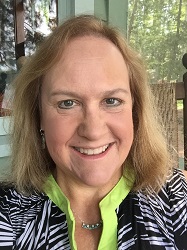Faces of COPD: Debbie Merrill, Vice President of the COPD Biomarkers Qualification Consortium
Posted on November 29, 2017 |
Debbie talks about her role at the Foundation, the importance of collaborative research in developing better therapies and ultimately a cure for COPD and her personal connection to the disease.
“COPD is the third-leading cause of death in the United States, however, no new classes of drugs have been approved for use in the US in more than 20 years,” says Debbie, Vice President of the COPD Biomarker Qualification Consortium (CBQC) at the COPD Foundation (COPDF). “This is in part because of the limited number of tests that are recognized by regulatory agencies. Qualifying new biomarkers and clinical outcomes will hopefully provide measures to facilitate the development of new treatments.”
 The importance of biomarkers is best described by the Food & Drug Administration’s Biomarker Qualification Program. This program “was established in 2010 to support the Center for Drug Evaluation and Research’s work with external stakeholders to develop biomarkers that aid in the drug development process…Biomarkers can be used in a variety of settings, including basic research, drug development and clinical practice. The Biomarker Qualification Program focuses on biomarkers used in drug development. Once a biomarker is qualified, it can be used in any drug development program under the context for which it obtained qualification.”
The importance of biomarkers is best described by the Food & Drug Administration’s Biomarker Qualification Program. This program “was established in 2010 to support the Center for Drug Evaluation and Research’s work with external stakeholders to develop biomarkers that aid in the drug development process…Biomarkers can be used in a variety of settings, including basic research, drug development and clinical practice. The Biomarker Qualification Program focuses on biomarkers used in drug development. Once a biomarker is qualified, it can be used in any drug development program under the context for which it obtained qualification.”
The mission of the CBQC is to (1) identify and qualify biomarkers and clinical outcomes to facilitate the development of new treatments for COPD; (2) facilitate collaboration among global researchers so the work is done efficiently. "By delivering on this mission, our pharmaceutical and academic partners will have the tools they need to better classify patients, e.g., by disease stage, and evaluate the effectiveness of treatments, which can lead to better therapies developed faster to benefit patients and open up more innovative and diverse avenues of research."
While COPDF’s ultimate goal is to find a cure for COPD, “that will likely not be accomplished in the near term,” says Debbie. “Therefore, as important research goes forward, there are new therapies that could be developed to improve the overall health of an individual with COPD. These therapies could help stop or slow exacerbations or even try to slow the progression of the disease.”
“Many pharmaceutical companies and universities are working to find drugs to do this and their collaboration on biomarkers and outcomes measures could facilitate fast-tracking potential therapies to the market. That’s how the CBQC can help,” says Debbie.
To date the CBQC has two measures qualified (plasma fibrinogen and the St. George’s respiratory questionnaire) with regulatory agencies and several more under active development, including measures of importance to patients such as exercise and physical activity
Debbie first learned about COPD “when my mother was diagnosed, around 2003. She went from a very vital, active person all her life to being very limited in her ability to go out of the house. It was a very difficult downward progression from her diagnosis to her death in 2009.”
“At that time,” says Debbie, “we were not aware of COPDF’s resources and education materials, so we felt a little like we were stumbling in the dark. If I had had access to better information, I would have encouraged her to go through pulmonary rehab,be more active and investigate other therapies and potentially clinical trials. We were very close and I miss her every day.”
The greatest misconception about COPD and those affected by it is that COPD “is always a death sentence. Since starting to work at COPDF in 2011, I have met so many people who are living proof that it can become a long-term, managed disease. They, and the researchers I work with, give me great hope that there will someday be a cure. We also need to continue to find ways to encourage people to stop (or not start) smoking.”
Debbie wants people to know that there are “so many wonderful things going on at the Foundation—cutting-edge research and opportunities for patients to become involved (through our COPD Patient-Powered Research Network), support for patients and caregivers through our amazing social platform (COPD360social), public policy and advocacy for COPD patients and top-notch educational materials.”
Asked about the one piece of advice Debbie would give to someone affected by COPD, either living with the disease or a loved one who’s been diagnosed, Debbie says “become as educated as you can as early as you can after diagnosis. The sooner you are able to make lifestyle changes, gain access to beneficial treatments, participate in important research and interact with others that are facing and meeting the same challenges you are, the better equipped you will be to manage your disease.”